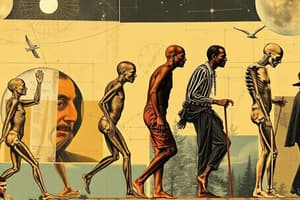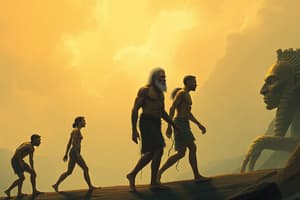Podcast
Questions and Answers
What is the main focus of Paleoanthropology?
What is the main focus of Paleoanthropology?
- The study of linguistic changes over time
- Human culture and social behavior
- Chemical analysis of fossils
- Human evolution and earlier hominids (correct)
Which sub-branch of anthropology involves the study of skeletal remains?
Which sub-branch of anthropology involves the study of skeletal remains?
- Archaeological Anthropology
- Osteology (correct)
- Forensic Anthropology
- Primatology
What distinguishes Micro Economics from Macro Economics?
What distinguishes Micro Economics from Macro Economics?
- Micro Economics examines inflation, while Macro Economics looks at price stability.
- Micro Economics studies individual agents, while Macro Economics focuses on the economy as a whole. (correct)
- Micro Economics deals with global markets, while Macro Economics concerns local markets.
- Micro Economics analyzes government policies, whereas Macro Economics studies household behaviors.
What does Cultural Anthropology primarily study?
What does Cultural Anthropology primarily study?
Which division of economics is concerned with total output and employment in an economy?
Which division of economics is concerned with total output and employment in an economy?
How does Forensic Anthropology contribute to physical anthropology?
How does Forensic Anthropology contribute to physical anthropology?
What is the primary goal of economics as a discipline?
What is the primary goal of economics as a discipline?
What is the literal meaning of the term 'psychologia'?
What is the literal meaning of the term 'psychologia'?
Who is acknowledged as the 'Father of Modern Psychology'?
Who is acknowledged as the 'Father of Modern Psychology'?
What does the term 'geographia' literally translate to?
What does the term 'geographia' literally translate to?
Which of the following is NOT one of the four goals of psychology?
Which of the following is NOT one of the four goals of psychology?
What does structural functionalism emphasize regarding society?
What does structural functionalism emphasize regarding society?
Which of the following is NOT a demographic process?
Which of the following is NOT a demographic process?
What is the primary focus of sociology as a field of study?
What is the primary focus of sociology as a field of study?
What is the ultimate goal of structural functionalism?
What is the ultimate goal of structural functionalism?
Which of the following key concepts is NOT associated with psychology?
Which of the following key concepts is NOT associated with psychology?
What does symbolic interactionism primarily focus on?
What does symbolic interactionism primarily focus on?
According to Herbert Blumer, how do humans interact with objects and symbols?
According to Herbert Blumer, how do humans interact with objects and symbols?
What does the Looking Glass Self Theory by Charles Cooley suggest?
What does the Looking Glass Self Theory by Charles Cooley suggest?
What is one criticism of the symbolic interactionism approach?
What is one criticism of the symbolic interactionism approach?
Which of the following best summarizes George Herbert Mead's view on language?
Which of the following best summarizes George Herbert Mead's view on language?
What term describes consequences that are intended and commonly recognized within social patterns?
What term describes consequences that are intended and commonly recognized within social patterns?
Which of the following is NOT considered a latent function of education?
Which of the following is NOT considered a latent function of education?
What does MARXISM primarily focus on in society?
What does MARXISM primarily focus on in society?
The term 'false class consciousness' refers to what concept in Marxist theory?
The term 'false class consciousness' refers to what concept in Marxist theory?
What is a common criticism of functional unity in societal structures?
What is a common criticism of functional unity in societal structures?
In the context of Marxism, who primarily controls political systems according to the views presented?
In the context of Marxism, who primarily controls political systems according to the views presented?
Which of the following best describes the role of education in society according to the information provided?
Which of the following best describes the role of education in society according to the information provided?
Which statement reflects a critique of Marxist theory?
Which statement reflects a critique of Marxist theory?
What does symbolic interactionism primarily focus on in society?
What does symbolic interactionism primarily focus on in society?
How are meanings attributed to symbols according to symbolic interactionism?
How are meanings attributed to symbols according to symbolic interactionism?
What is a key aspect of the interactionist view on human behavior?
What is a key aspect of the interactionist view on human behavior?
In the context of symbolic interactionism, how is reality perceived?
In the context of symbolic interactionism, how is reality perceived?
What role do individuals play according to the ideas presented in symbolic interactionism?
What role do individuals play according to the ideas presented in symbolic interactionism?
Which of the following statements about culture is true according to symbolic interactionism?
Which of the following statements about culture is true according to symbolic interactionism?
Which example illustrates a key concept of symbolic interactionism?
Which example illustrates a key concept of symbolic interactionism?
What process is highlighted by the use of the Filipino word 'bintana' in relation to symbolic interactionism?
What process is highlighted by the use of the Filipino word 'bintana' in relation to symbolic interactionism?
Flashcards are hidden until you start studying
Study Notes
Physical Anthropology and Sub-Branches
- Analyzes human fossil remains to study human evolution and earlier hominids (Paleoanthropology).
- Genetics focuses on gene structures and patterns of trait inheritance.
- Primatology studies non-human primates to understand evolutionary links.
- Osteology examines skeletal remains, providing insights into human development.
- Paleopathology identifies traces of diseases and injuries in human skeletons.
- Forensic anthropology aids in the analysis and identification of human remains.
- Cultural anthropology explores the culture and social practices of different peoples.
Archaeological Anthropology
- Studies earlier cultures through material remains left by previous societies.
- Aims to reconstruct daily life, customs, and cultural changes over time.
Linguistic Anthropology
- Investigates human speech and language and their evolution.
- Focuses on processes of communication and language use.
Economics
- Defined as the discipline studying how societies manage scarce resources.
- Derived from Greek words "oikos" (house) and "nomos" (custom or law).
- Goal: Develop policies to minimize problems and maximize daily benefits.
Divisions of Economics
- Microeconomics analyzes behavior of individual agents such as households and firms.
- Macroeconomics examines the economy as a whole, including inflation, unemployment, total output, and income.
Geography
- Derived from Greek "geographia," meaning to describe the earth.
- Maps represent areas in a two-dimensional format.
Psychology
- The term originates from Latin "psychologia," meaning the study of the soul.
- Key goals are to describe, explain, predict, and change behaviors.
- Studies mental processes, including cognition, perception, and memory.
Wilhelm Wundt
- Known as the "Father of Modern Psychology," founder of experimental psychology.
- Earned a medical degree and pioneered cultural psychology.
Sociology
- Derived from Latin "socius" (companion) and Greek "logos" (study of).
- Focuses on patterns of human interaction influenced by historical events and social influences.
Demography
- The study of human populations, focusing on birth, migration, and aging/death.
Structural Functionalism
- Views society as a complex system of interconnected parts promoting stability.
- Examines social structures (e.g., religion, education, family) that fulfill essential functions.
- Social problems are seen as disruptions that threaten societal equilibrium.
Marxism
- Emerged in the 19th century, highlighting the struggle between bourgeoisie and proletariat.
- Emphasizes social inequality and injustice through capitalist exploitation.
- Criticizes the ruling class for manipulating societal values and beliefs.
Symbolic Interactionism
- Focuses on communication patterns and the meanings attributed to symbols in society.
- Emphasizes interaction as the basis for creating social realities.
- Explains how individuals derive meanings from social interactions and modify perceptions over time.
Herbert Blumer
- Proposed that human actions are based on the meanings attributed to things.
- Focuses on the interpretative process individuals use in social interactions.
Charles Cooley
- Developed the "Looking Glass Self" theory, where self-perception arises through social interactions.
George Herbert Mead
- Highlighted the role of language and symbols in communication and socialization.
Criticisms
- Structural functionalism doesn't account for societal conflicts and opposing interests.
- Marxist theory viewed as advocating revolution and materialistic changes.
- Symbolic interactionism criticized for lack of empirical testability and predictability due to reliance on qualitative data.
Studying That Suits You
Use AI to generate personalized quizzes and flashcards to suit your learning preferences.




